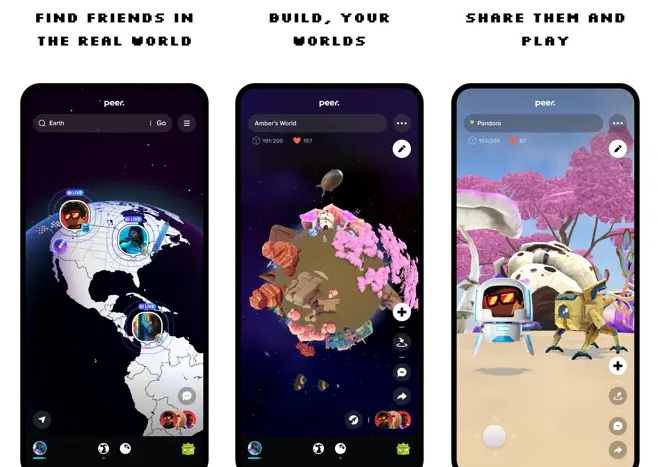March 7, 2025 – Peer Global Inc., a provider of a real-time 3D social exploration platform, has this week announced that it has raised USD $10.5 million in funding to accelerate the development of its metaverse game engine platform. According to the company, the Family Office of Tommy Mai was the sole investor in this round, bringing Peer’s total funding to date to USD $65.5 million, received entirely from angel investors. The new funding will be used to expand hiring and further AI product development.
Peer is a persistent 3D world that blends exploration elements similar to Pokémon GO with user-generated experiences akin to those on platforms like Roblox. Users can create personal online “planets,” serving as virtual spaces where they can interact, share content, and engage in gaming experiences.
In addition to the funding announcement, Peer has launched “personal planets,” introducing 3D interactive spaces designed to integrate exploration, creativity, and social interaction. Built on its proprietary metaverse game engine, the platform enables the creation of interconnected games within a unified virtual environment.
“Peer is pioneering a new kind of digital frontier where AI and 3D technology come together to deliver vast, immersive, and interactive spaces,” said Tony Tran, founder of Peer. “This isn’t just a platform—it’s a reinvention of how we connect, explore, and create, offering a transformative alternative to the status quo.”

Peer positions itself as an alternative to traditional social media, which the company describes as “built around linear timelines and passive scrolling.” Instead, Peer offers a 3D space where interaction is “immersive, not addictive.” Rather than passively viewing posts in a chronological feed, users can engage with content in a spatial, immersive format, navigating a simulated 3D world where digital content is placed within relevant virtual locations.
For example, photos taken during a real hike can be displayed on a virtual trail in a mountain environment that resembles the real-world location, according to the company. Peer also integrates AI-driven spatial interaction models to apply layers of immersion to recreate what was captured, such as the sound of rustling leaves.
With AI, users can then build out their personal planets with customizable elements such as landscapes, buildings, and interactive features. Additionally, brands and influencers can create their own virtual spaces using AI-generated content and participate in advertising opportunities, including in-game sponsorships and digital asset creation.
Personal Planets on Peer: A Place to Post and Play
With the launch of personal planets, Peer introduces the 3D version of a social home page, in the form of a 3D planet. Instead of a profile page, users are given a library to build out their own planet with flora, fauna, rocks, houses, and more. If a user’s friends are on their planet and moving about, the user can see them there in real time.
Furthermore, each mini planet has longitude and latitude coordinates that mirror those of Earth, meaning if a user posts a picture on their planet, it will be placed according to wherever it was taken geospatially, according to the company (i.e., an image taken at the North Pole would be placed at the corresponding position on a Peer planet).
“Websites, social networks, and digital brand experiences today are flat. People have short attention spans,” said Peer investor Tommy Mai. “AI will push everything into spatial experiences, and Peer is leading the way.”
The Peer app is available for download on iOS and Android today. For more information on Peer and its 3D social platform, please visit the company’s website.
Image / video credit: Peer / YouTube
About the author
Sam is the Founder and Managing Editor of Auganix. With a background in research and report writing, he has been covering XR industry news for the past seven years.




